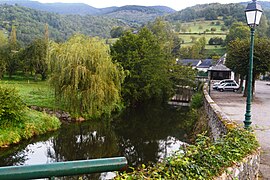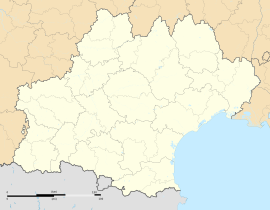Aucazein
Aucazein | |
|---|---|
 The Bouigane River at Aucazein | |
| Coordinates: 42°56′12″N 0°58′32″E / 42.9367°N 0.9756°E | |
| Country | France |
| Region | Occitania |
| Department | Ariège |
| Arrondissement | Saint-Girons |
| Canton | Couserans Ouest |
| Intercommunality | Castillonnais |
| Government | |
| • Mayor (2014–2020) | Claude Geslin |
Area 1 | 6.02 km2 (2.32 sq mi) |
| Population (2010) | 64 |
| • Density | 11/km2 (28/sq mi) |
| Time zone | UTC+01:00 (CET) |
| • Summer (DST) | UTC+02:00 (CEST) |
| INSEE/Postal code | 09025 /09800 |
| Elevation | 531–1,682 m (1,742–5,518 ft) (avg. 550 m or 1,800 ft) |
| 1 French Land Register data, which excludes lakes, ponds, glaciers > 1 km2 (0.386 sq mi or 247 acres) and river estuaries. | |
Aucazein is a commune in the Ariège department in the Occitanie region of south-western France.
The inhabitants of the commune are known as Aucazénois.[1]
Geography
Aucazein is located in the Ariège Natural Regional Park some 40 km south-east of Saint-Gaudens in a direct line and 20 km west by south-west of Saint-Girons at an altitude of 570 metres. Access to the commune is by road D 618 from Orgibet in the west which passes through the north of the commune and the village and continues east to Argein. Most of the land area of the commune is rugged and forested however the valley where the village is located has some farmland.[2]
The Bouigane river flows east along the valley and through the village on its way to join the Lez at Audressein. The Ruisseau de Cassech forms the western border of the commune as it flows north to join the Bouigane. Similarly La Rivière forms the eastern border of the commune and also joins the Bouigane. The Ruisseau de Recoule flows from the north and passes through the commune for a short distance before joining the Bouigane.[2]
Neighbouring communes and villages[2]
History
The commune is located on the Way of St. James which crosses Ariège. The Knights Templar built a Romanesque chapel in the commune.
Administration

List of Successive Mayors[3]
| From | To | Name | Party | Position |
|---|---|---|---|---|
| 2001 | 2008 | Claude Vignes | ||
| 2008 | 2014 | Claude Dupuy | ||
| 2014 | 2020 | Claude Geslin |
(Not all data is known)
Demography
In 2010 the commune had 64 inhabitants. The evolution of the number of inhabitants is known from the population censuses conducted in the commune since 1793. From the 21st century, a census of communes with fewer than 10,000 inhabitants is held every five years, unlike larger towns that have a sample survey every year.[Note 1]
Template:Table Population Town

Sites and monuments

The commune has one site that is registered as a historical monument:
- An Ornamental Garden
 [4]
[4]
The commune has some other sites of interest:
- The Remains of a feudal Chateau (private property)
- 2 Mills
- An Oratory
- The Church of Saint-Aubin
- A Metal Bridge built in 1905 over the Bouigane
See also
External links
- Aucazein on Lion1906
- Aucazein on Google Maps
- Aucazein on Géoportail, National Geographic Institute (IGN) website Template:Fr icon
- Aucasein on the 1750 Cassini Map
- Aucazein on the INSEE website Template:Fr icon
- INSEE Template:Fr icon
Notes and references
Notes
- ^ At the beginning of the 21st century, the methods of identification have been modified by Law No. 2002-276 of 27 February 2002 Archived 6 March 2016 at the Wayback Machine, the so-called "law of local democracy" and in particular Title V "census operations" allows, after a transitional period running from 2004 to 2008, the annual publication of the legal population of the different French administrative districts. For communes with a population greater than 10,000 inhabitants, a sample survey is conducted annually, the entire territory of these communes is taken into account at the end of the period of five years. The first "legal population" after 1999 under this new law came into force on 1 January 2009 and was based on the census of 2006.
References
- ^ Inhabitants of Ariège Template:Fr icon
- ^ a b c Google Maps
- ^ List of Mayors of France Template:Fr icon
- ^ Ministry of Culture, Mérimée IA09000020 Ornamental Garden Template:Fr icon



